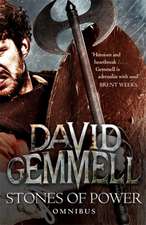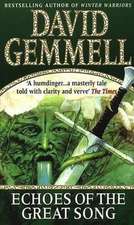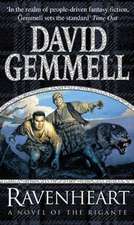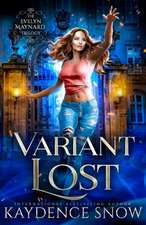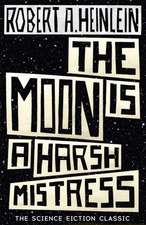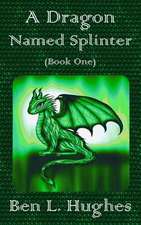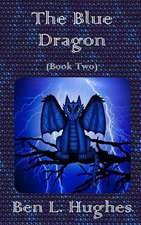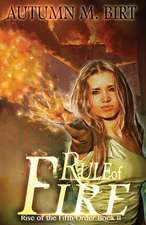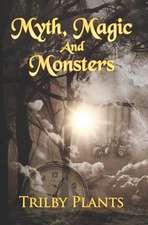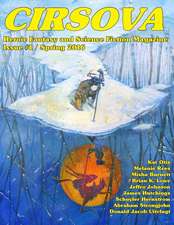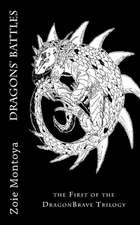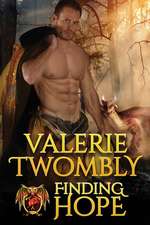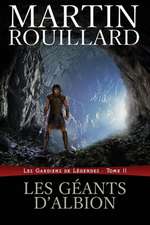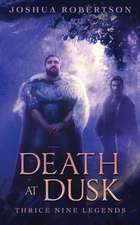Legend: Drenai
Autor David Gemmellen Limba Engleză Paperback – oct 2009
The stories of his life are told everywhere. But the grizzled veteran has spurned a life of fame and fortune and retreated to the solitude of his mountain lair.
His home is Dros Delnoch.
And it is the only route through the mountains for the army laying waste the country around them. Once the stronghold of the Drenai, the fortress of Dros Delnoch will now be their last battleground. And Druss will be its last hope.
His story is LEGEND.
The Drenai Novels:
LEGEND
THE KING BEYOND THE GATE
WAYLANDER
QUEST FOR LOST HEROES
WAYLANDER II
THE FIRST CHRONICLES OF DRUSS THE LEGEND
www.orbitbooks.net
Fantasy
ISBN 9781841498584
[Ebook logo]
| Toate formatele și edițiile | Preț | Express |
|---|---|---|
| Paperback (2) | 51.59 lei 3-5 săpt. | +29.52 lei 7-11 zile |
| Little Brown Book Group – oct 2009 | 51.59 lei 3-5 săpt. | +29.52 lei 7-11 zile |
| Del Rey Books – 30 sep 1994 | 55.44 lei 3-5 săpt. |
Preț: 51.59 lei
Preț vechi: 65.34 lei
-21% Nou
Puncte Express: 77
Preț estimativ în valută:
9.87€ • 10.31$ • 8.15£
9.87€ • 10.31$ • 8.15£
Carte disponibilă
Livrare economică 25 martie-08 aprilie
Livrare express 11-15 martie pentru 39.51 lei
Preluare comenzi: 021 569.72.76
Specificații
ISBN-13: 9781841498584
ISBN-10: 1841498580
Pagini: 352
Dimensiuni: 127 x 197 x 22 mm
Greutate: 0.38 kg
Editura: Little Brown Book Group
Seria Drenai
Locul publicării:United Kingdom
ISBN-10: 1841498580
Pagini: 352
Dimensiuni: 127 x 197 x 22 mm
Greutate: 0.38 kg
Editura: Little Brown Book Group
Seria Drenai
Locul publicării:United Kingdom
Descriere
David Gemmell's first novel and the first in the Drenai saga - a bestselling classic of heroic fantasy
Extras
1
Rek was drunk. Not enough to matter but not enough not to matter, he thought, staring at the ruby wine casting blood shadows in the lead crystal glass. A log fire in the hearth warmed his back, the smoke stinging his eyes, the acrid smell of it mixing with the odor of unwashed bodies, forgotten meals, and musty, damp clothing. A lantern flame danced briefly in the icy wind as a shaft of cold air brushed the room. Then it was gone as a newcomer slammed shut the wooden door, muttering his apologies to the crowded inn.
Conversation, which had died in the sudden blast of frosty air, now resumed, a dozen voices from different groups merging into a babble of meaningless sounds. Rek sipped his wine. He shivered as someone laughed; the sound was as cold as the winter beating against the wooden walls. Like someone walking over your grave, he thought. He pulled his blue cloak more tightly about his shoulders. He did not need to hear the words to know the topic of every conversation: It had been the same for days.
War.
Such a little word, such a depth of agony. Blood, death, conquest, starvation, plague, and horror.
More laughter burst upon the room. “Barbarians!” roared a voice above the rabble. “Easy meat for Drenai lances.” More laughter.
Rek stared at the crystal goblet. So beautiful. So fragile. Crafted with care, even love, multifaceted like a gossamer diamond. He lifted the crystal close to his face, seeing a dozen eyes reflected there.
And each accused. For a second he wanted to crush the glass into fragments, destroy the eyes and the accusation. But he did not. I am not a fool, he told himself. Not yet.
Horeb, the innkeeper, wiped his thick fingers on a towel and cast a tired yet wary eye over the crowd, alert for trouble, ready to step in with a word and a smile before the snarl and a fist became necessary. War. What was it about the prospect of such bloody enterprises that reduced men to the level of animals? Some of the drinkers–most, in fact–were well known to Horeb. Many were family men: farmers, traders, artisans. All were friendly; most were compassionate, trustworthy, even kindly. And here they were talking of death and glory and ready to thrash or slay any suspected of Nadir sympathies. The Nadir–even the name spoke of contempt.
But they’ll learn, he thought sadly. Oh, how they’ll learn! Horeb’s eyes scanned the large room, warming as they lighted upon his daughters, who were cleaning tables and delivering tankards. Tiny Dori blushing beneath her freckles at some ribald jest; Besa, the image of her mother, tall and fair; Nessa, fat and plain and loved by all, soon to marry the baker’s apprentice Norvas. Good girls. Gifts of joy. Then his gaze fell on the tall figure in the blue cloak seated by the window.
“Damn you, Rek, snap out of it,” he muttered, knowing the man would never hear him. Horeb turned away, cursed, then removed his leather apron and grasped a half-empty jug of ale and a tankard. As an afterthought he opened a small cupboard and removed a bottle of port he had been saving for Nessa’s wedding.
“A problem shared is a problem doubled,” he said, squeezing into the seat opposite Rek.
“A friend in need is a friend to be avoided,” Rek countered, accepting the proffered bottle and refilling his glass. “I knew a general once,” he said, staring at the wine, twirling the glass slowly with his long fingers. “Never lost a battle. Never won one, either.”
“How so?” asked Horeb.
“You know the answer. I’ve told you before.”
“I have a bad memory. Anyway, I like to listen to you tell stories. How could he never lose and never win?”
“He surrendered whenever threatened,” said Rek. “Clever, eh?”
“How come men followed him if he never won?”
“Because he never lost. Neither did they.”
“Would you have followed him?” asked Horeb.
“I don’t follow anyone anymore. Least of all generals.” Rek turned his head, listening to the interweaving chatter. He closed his eyes, concentrating. “Listen to them,” he said softly. “Listen to their talk of glory.”
“They don’t know any better, Rek, my friend. They haven’t seen it, tasted it. Crows like a black cloud over a battlefield feasting on dead men’s eyes, foxes jerking at severed tendons, worms . . .”
“Stop it, damn you . . . I don’t need reminding. Well, I’m damned if I’ll go. When’s Nessa getting married?
“In three days,” answered Horeb. “He’s a good boy; he’ll look after her. Keeps baking her cakes. She’ll be like a tub before long.”
“One way or another,” said Rek with a wink.
“Indeed, yes,” answered Horeb, grinning broadly. The men sat in their own silence, allowing the noise to wash over them, each drinking and thinking, secure within their circle of two. After a while Rek leaned forward.
“The first attack will be at Dros Delnoch,” he said. Do you know they’ve only ten thousand men there?”
“I heard it was less than that. Abalyn’s been cutting back on the regulars and concentrating on militia. Still, there’re six high walls and a strong keep. And Delnar’s no fool–he was at the Battle of Skeln.”
“Really?” said Rek. “I heard that was one man against ten thousand, hurling mountains of ice on the foe.”
“The saga of Druss the Legend,” said Horeb, deepening his voice. “The tale of a giant whose eyes were death and whose ax was terror. Gather around, children, and keeps from the shadows lest evil lurks as I tell my tale.”
“You bastard!” said Rek. “That used to terrify me. You knew him, didn’t you–the Legend, I mean?”
“A long time ago. They say he’s dead. If not, he must be over sixty. We were in three campaigns together, but I only spoke to him twice. I saw him in action once, though.”
“Was he good?” asked Rek.
“Awesome. It was just before Skeln and the defeat of the Immortals. Just a skirmish really. Yes, he was very good.”
“You’re not terribly strong on detail, Horeb.”
“You want me to sound like the rest of these fools, jabbering about war and death and slaying?”
“No,” said Rek, draining his wine. “No, I don’t. You know me, don’t you?”
“Enough to like you. Regardless.”
“Regardless of what?”
“Regardless of the fact that you don’t like yourself.”
“On the contrary,” said Rek, pouring a fresh glass. “I like myself well enough. It’s just that I know myself better than most people.”
“You know, Rek, sometimes I think you ask too much of yourself.”
“No. No, I ask very little. I know my weaknesses.”
“It’s a funny thing about weakness,” said Horeb. “Most people will tell you they know their weaknesses. When asked, they tell you, ‘Well, for one thing I’m overgenerous.’ Come on, then; list yours if you must. That’s what innkeepers are for.”
“Well, for one thing I’m overgenerous, especially to innkeepers.”
Horeb shook his head, smiled, and lapsed into silence.
Too intelligent to be a hero, too frightened to be a coward, he thought. He watched his friend empty his glass, life it to his face, and peer at his own fragmented image. For a moment Horeb thought he would smash it, such had been the anger on Rek’s flushed face.
Then the younger man gently returned tha goblet to the wooden table.
“I’m not a fool,” he said softly. He stiffened as he realized he had spoken aloud. “Damn!” he said. “The drink finally got ot me.”
“Let me give you a hand to your room,” offered Horeb.
“Is there a candle lit?” asked Rek, swaying in his seat.
“Of course.”
“You won’t let it go out on me, will you? Not keen on the dark. Not frightened, you understand. Just don’t like it.”
“I won’t let it go out, Rek. Trust me.”
“I trust you. I rescued you, didn’t I? Remember?”
“I remember. Give me your arm. I’ll guide you to the stairs. This way. That’s good. One foot in front of the other. Good!”
“I didn’t hesitate. Straight in with my sword raised, didn’t I?”
“Yes.”
“No, I didn’t. I stood for two minutes, shaking. And you got cut.”
“But you still came in, Rek. Don’t you see? It didn’t matter about the cut–you still rescued me.”
“It matters to me. Is there a candle in my room?”
Behind him was the fortress, grim and gray, outlined in flame and smoke. The sounds of battle filled his ears, and he ran, heart pounding, his breathing ragged. He glanced behind him. The fortress was close, closer than it had been. Ahead were the green hills sheltering the Sentran Plain. They shimmered and retreated before him, taunting him with their tranquility. He ran faster. A shadow fell across him. The gates of the fortress opened. He strained against the force pulling him back. He cried and begged. But the gates closed, and he was back in the center of the battle, a bloody sword in his shaking hand.
He awoke, eyes wide, nostrils flared, the beginning of a scream swelling his lungs. A soft hand stroked his face, and gentle words soothed him. His eyes focused. Dawn was nearing, the pink light of a virgin day piercing the ice on the inside of the bedroom window. He rolled over.
Rek was drunk. Not enough to matter but not enough not to matter, he thought, staring at the ruby wine casting blood shadows in the lead crystal glass. A log fire in the hearth warmed his back, the smoke stinging his eyes, the acrid smell of it mixing with the odor of unwashed bodies, forgotten meals, and musty, damp clothing. A lantern flame danced briefly in the icy wind as a shaft of cold air brushed the room. Then it was gone as a newcomer slammed shut the wooden door, muttering his apologies to the crowded inn.
Conversation, which had died in the sudden blast of frosty air, now resumed, a dozen voices from different groups merging into a babble of meaningless sounds. Rek sipped his wine. He shivered as someone laughed; the sound was as cold as the winter beating against the wooden walls. Like someone walking over your grave, he thought. He pulled his blue cloak more tightly about his shoulders. He did not need to hear the words to know the topic of every conversation: It had been the same for days.
War.
Such a little word, such a depth of agony. Blood, death, conquest, starvation, plague, and horror.
More laughter burst upon the room. “Barbarians!” roared a voice above the rabble. “Easy meat for Drenai lances.” More laughter.
Rek stared at the crystal goblet. So beautiful. So fragile. Crafted with care, even love, multifaceted like a gossamer diamond. He lifted the crystal close to his face, seeing a dozen eyes reflected there.
And each accused. For a second he wanted to crush the glass into fragments, destroy the eyes and the accusation. But he did not. I am not a fool, he told himself. Not yet.
Horeb, the innkeeper, wiped his thick fingers on a towel and cast a tired yet wary eye over the crowd, alert for trouble, ready to step in with a word and a smile before the snarl and a fist became necessary. War. What was it about the prospect of such bloody enterprises that reduced men to the level of animals? Some of the drinkers–most, in fact–were well known to Horeb. Many were family men: farmers, traders, artisans. All were friendly; most were compassionate, trustworthy, even kindly. And here they were talking of death and glory and ready to thrash or slay any suspected of Nadir sympathies. The Nadir–even the name spoke of contempt.
But they’ll learn, he thought sadly. Oh, how they’ll learn! Horeb’s eyes scanned the large room, warming as they lighted upon his daughters, who were cleaning tables and delivering tankards. Tiny Dori blushing beneath her freckles at some ribald jest; Besa, the image of her mother, tall and fair; Nessa, fat and plain and loved by all, soon to marry the baker’s apprentice Norvas. Good girls. Gifts of joy. Then his gaze fell on the tall figure in the blue cloak seated by the window.
“Damn you, Rek, snap out of it,” he muttered, knowing the man would never hear him. Horeb turned away, cursed, then removed his leather apron and grasped a half-empty jug of ale and a tankard. As an afterthought he opened a small cupboard and removed a bottle of port he had been saving for Nessa’s wedding.
“A problem shared is a problem doubled,” he said, squeezing into the seat opposite Rek.
“A friend in need is a friend to be avoided,” Rek countered, accepting the proffered bottle and refilling his glass. “I knew a general once,” he said, staring at the wine, twirling the glass slowly with his long fingers. “Never lost a battle. Never won one, either.”
“How so?” asked Horeb.
“You know the answer. I’ve told you before.”
“I have a bad memory. Anyway, I like to listen to you tell stories. How could he never lose and never win?”
“He surrendered whenever threatened,” said Rek. “Clever, eh?”
“How come men followed him if he never won?”
“Because he never lost. Neither did they.”
“Would you have followed him?” asked Horeb.
“I don’t follow anyone anymore. Least of all generals.” Rek turned his head, listening to the interweaving chatter. He closed his eyes, concentrating. “Listen to them,” he said softly. “Listen to their talk of glory.”
“They don’t know any better, Rek, my friend. They haven’t seen it, tasted it. Crows like a black cloud over a battlefield feasting on dead men’s eyes, foxes jerking at severed tendons, worms . . .”
“Stop it, damn you . . . I don’t need reminding. Well, I’m damned if I’ll go. When’s Nessa getting married?
“In three days,” answered Horeb. “He’s a good boy; he’ll look after her. Keeps baking her cakes. She’ll be like a tub before long.”
“One way or another,” said Rek with a wink.
“Indeed, yes,” answered Horeb, grinning broadly. The men sat in their own silence, allowing the noise to wash over them, each drinking and thinking, secure within their circle of two. After a while Rek leaned forward.
“The first attack will be at Dros Delnoch,” he said. Do you know they’ve only ten thousand men there?”
“I heard it was less than that. Abalyn’s been cutting back on the regulars and concentrating on militia. Still, there’re six high walls and a strong keep. And Delnar’s no fool–he was at the Battle of Skeln.”
“Really?” said Rek. “I heard that was one man against ten thousand, hurling mountains of ice on the foe.”
“The saga of Druss the Legend,” said Horeb, deepening his voice. “The tale of a giant whose eyes were death and whose ax was terror. Gather around, children, and keeps from the shadows lest evil lurks as I tell my tale.”
“You bastard!” said Rek. “That used to terrify me. You knew him, didn’t you–the Legend, I mean?”
“A long time ago. They say he’s dead. If not, he must be over sixty. We were in three campaigns together, but I only spoke to him twice. I saw him in action once, though.”
“Was he good?” asked Rek.
“Awesome. It was just before Skeln and the defeat of the Immortals. Just a skirmish really. Yes, he was very good.”
“You’re not terribly strong on detail, Horeb.”
“You want me to sound like the rest of these fools, jabbering about war and death and slaying?”
“No,” said Rek, draining his wine. “No, I don’t. You know me, don’t you?”
“Enough to like you. Regardless.”
“Regardless of what?”
“Regardless of the fact that you don’t like yourself.”
“On the contrary,” said Rek, pouring a fresh glass. “I like myself well enough. It’s just that I know myself better than most people.”
“You know, Rek, sometimes I think you ask too much of yourself.”
“No. No, I ask very little. I know my weaknesses.”
“It’s a funny thing about weakness,” said Horeb. “Most people will tell you they know their weaknesses. When asked, they tell you, ‘Well, for one thing I’m overgenerous.’ Come on, then; list yours if you must. That’s what innkeepers are for.”
“Well, for one thing I’m overgenerous, especially to innkeepers.”
Horeb shook his head, smiled, and lapsed into silence.
Too intelligent to be a hero, too frightened to be a coward, he thought. He watched his friend empty his glass, life it to his face, and peer at his own fragmented image. For a moment Horeb thought he would smash it, such had been the anger on Rek’s flushed face.
Then the younger man gently returned tha goblet to the wooden table.
“I’m not a fool,” he said softly. He stiffened as he realized he had spoken aloud. “Damn!” he said. “The drink finally got ot me.”
“Let me give you a hand to your room,” offered Horeb.
“Is there a candle lit?” asked Rek, swaying in his seat.
“Of course.”
“You won’t let it go out on me, will you? Not keen on the dark. Not frightened, you understand. Just don’t like it.”
“I won’t let it go out, Rek. Trust me.”
“I trust you. I rescued you, didn’t I? Remember?”
“I remember. Give me your arm. I’ll guide you to the stairs. This way. That’s good. One foot in front of the other. Good!”
“I didn’t hesitate. Straight in with my sword raised, didn’t I?”
“Yes.”
“No, I didn’t. I stood for two minutes, shaking. And you got cut.”
“But you still came in, Rek. Don’t you see? It didn’t matter about the cut–you still rescued me.”
“It matters to me. Is there a candle in my room?”
Behind him was the fortress, grim and gray, outlined in flame and smoke. The sounds of battle filled his ears, and he ran, heart pounding, his breathing ragged. He glanced behind him. The fortress was close, closer than it had been. Ahead were the green hills sheltering the Sentran Plain. They shimmered and retreated before him, taunting him with their tranquility. He ran faster. A shadow fell across him. The gates of the fortress opened. He strained against the force pulling him back. He cried and begged. But the gates closed, and he was back in the center of the battle, a bloody sword in his shaking hand.
He awoke, eyes wide, nostrils flared, the beginning of a scream swelling his lungs. A soft hand stroked his face, and gentle words soothed him. His eyes focused. Dawn was nearing, the pink light of a virgin day piercing the ice on the inside of the bedroom window. He rolled over.
Notă biografică
David Gemmell






